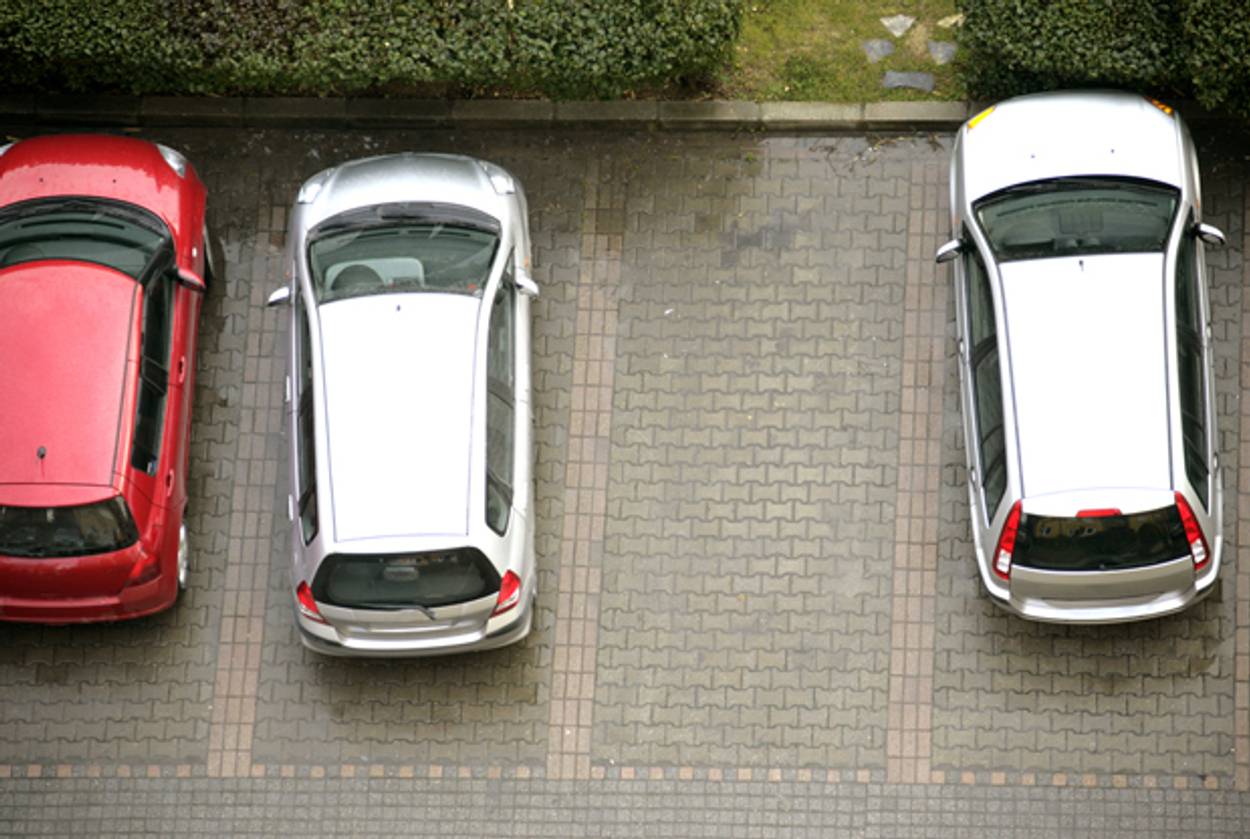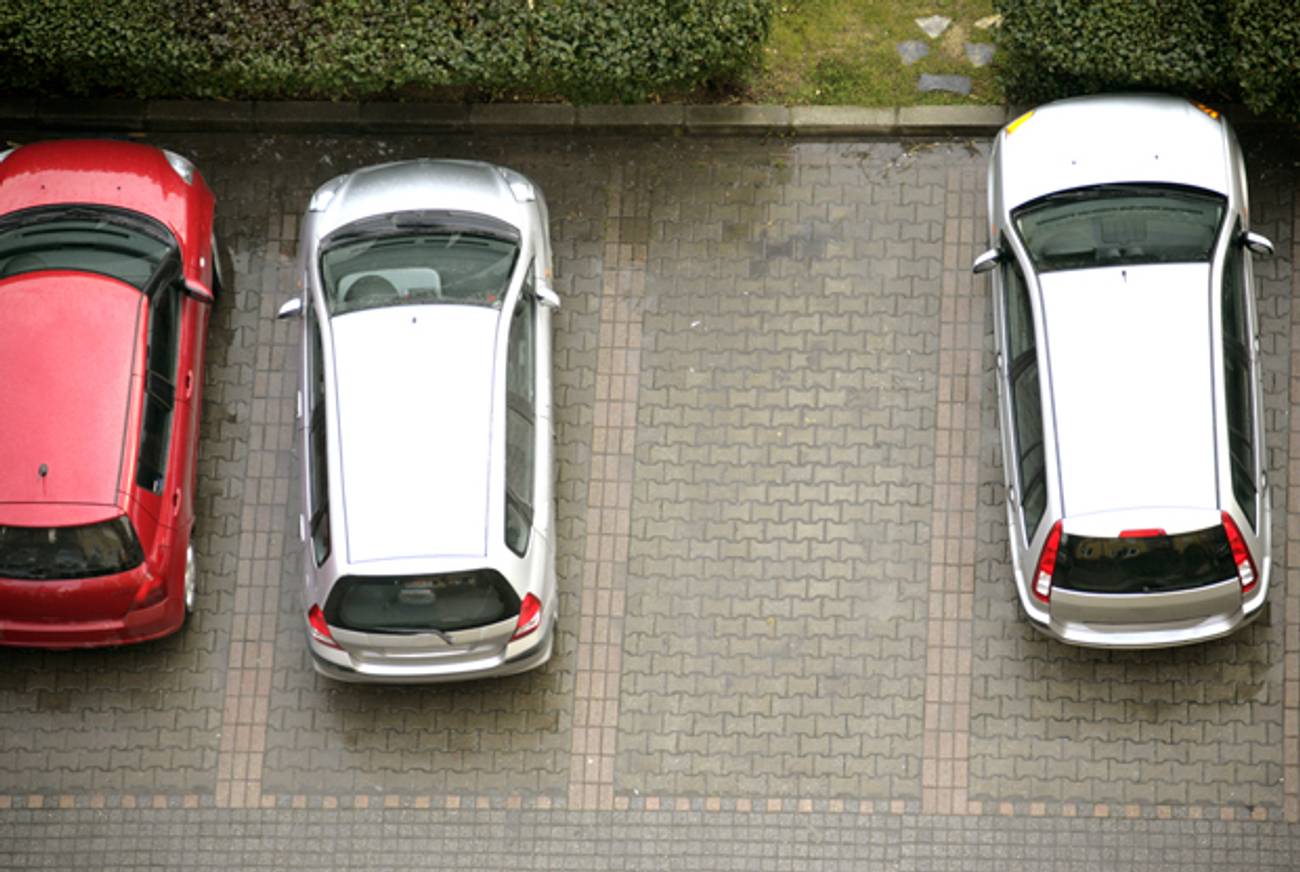God Is My Traffic Cop
I keep getting messages from God about driving on the Sabbath, so I’m going give it up—for one Saturday




The thought first entered my mind when my car was vandalized in the synagogue parking lot during Saturday morning services.
It was 2008, my first time at the synagogue in Pasadena; I had recently moved from West L.A. and still clung to the tradition that wherever you go, the first thing you do is ring the local house of worship, hoping someone there can provide you with spiritual guidance and a list of the best bagel places in the area. I made it through the whole service and stayed to schmooze at the kiddush luncheon, where a bunch of Jewish women with name tags descended upon me like seagulls attacking a carton of french fries left unattended on a beach towel, pressuring me to join their congregation, attempting to lure me in with herring and whitefish salad and the sexy prospect of monthly synagogue sisterhood meetings. But while I’m a sucker for the shtetl food of my Eastern European great-grandparents, I was also several months pregnant with my second child, nauseated, and anxious to get back home. When Boaz, my toddler son, started throwing a tantrum because it was nap time, and because a lady who smelled like the perfume department of Ross Dress for Less was tickling him under the chin, I knew it was time to make a clean getaway.
I walked outside and saw the passenger side window of my car smashed into a thousand pieces, a glittery heap of broken glass on the cement. I’d left my cell phone and purse in the car because I didn’t know if people at this Conservative shul were shomer Shabbat or if this was one of those “California Conservative” synagogues where the clergy plays acoustic guitar and the congregants are actually Reform; I’d erred on the side of halakhah. Unfortunately, nowhere in the Talmud tractate Shabbat does it state that one should always leave one’s valuables in the trunk of one’s vehicle (which one shouldn’t be driving on Shabbat anyway), lest a petty thief come along, spot one’s antiquated flip phone and all-time favorite leather Coach cross-body bag on the seat, throw a large rock through one’s window, and take off with everything. And now I didn’t have a phone to call the police. So, I had to go back inside.
When I announced to everybody, “My car’s been broken into,” people shuffled about, unsure what to do. (At least one of Boaz’s new ladyfriends seemed disappointed that I hadn’t come back to request a membership packet.) Pretty much everybody except for the rabbi (a former DJ who played the drum) had their cell phones either stuffed in a blazer pocket or in a giant purse, but had silenced them, and there was a long moment of acute awkwardness as they tried to figure out whether or not it was OK to turn them back on in the presence of the groovy percussionist rabbi. Finally, a girl in a sleeveless dress that showed off a tattoo on her shoulder blade pushed a phone into my hand.
I called my husband, who was off playing tennis with a friend that day because he’s a bad Jew, which I made a point of screaming at him repeatedly when I called to let him know that our leased Subaru Forester had been ransacked. Then I called the cops, who arrived hours later, scribbling notes while the concerned congregants who’d stuck around looked on, circling my car and squinting like the amateur cast of CSI: Pasadena. I was swimming in shame and embarrassment. The whole reason I’d parked my car in the far right-hand corner of the lot was to avoid advertising the fact that I’d driven it there that day. Clearly, my plan had backfired.
As the crowd slowly retreated, I asked myself: Was I unsettled because I committed a Shabbat “crime,” or because I’d gotten caught? Of course, the congregants didn’t think less of me for driving; most of them had driven, too. This was Pasadena, a city that despite its small, tight-knit Jewish community, was a bastion of Christianity with a church on every corner. But I couldn’t shake the nagging feeling that I’d done something seriously wrong and that somebody on high was sending me a message. I was a speck of dust in the synagogue parking lot, and God was wagging a finger: You can hide from congregants, He seemed to be saying, but you can’t hide from Me.
Did I listen? No.
After the Great Shabbat Car Incident of 2008, I continued to drive on the Day of Rest and paid for it in the steady trickle of minor Shabbat-driving-related infractions that followed over the next four years: parking tickets, dead batteries, cosmetic dings, flat tires, and fender benders—all received on the Sabbath. One Saturday, Boaz unfastened his seat belt in our driveway and a police officer just happened to be around the corner and just happened to see him purposely launch himself in the air and hit his head against the roof of the car, making fake explosive sounds while pretending to be a Skylander Giant; the officer wrote me a warning for endangering my child.
God was trying to tell me something. When was I going to listen?
***
To understand what not driving on Shabbat would entail for me, though, you have to know something about Los Angeles. L.A. is a city engulfed in car culture. It is an asphalt jungle, a smoggy cement network of freeways and exit ramps. There are cars everywhere. There’s an old joke that it takes 20 minutes to drive anywhere in L.A., but anybody who lives here knows that’s false—it takes an hour and 20 minutes. L.A. is a sprawling city, with neighborhoods spread far and wide, and not everybody lives within walking distance of their synagogue of choice. So integrated are cars into the common vernacular that there are rabbis who espouse a level of observance they call “shomer Shabbat ABC (All But Cars).”
Not driving on Shabbat would entail a radical shift in my family’s social life. We’d have to say no to the ballet classes and birthday parties and bat mitzvahs on the other side of town. I’d have to give up my Saturday afternoon Al-Anon meeting. And the honest truth is that, despite the stack of unpaid parking tickets in my sock drawer, I just wasn’t ready to make those sacrifices.
But clearly I was being monitored by a higher authority, One who wasn’t cutting me any slack. I finally found a Chabad house closer to home—1.1 miles to be exact—and my husband (OK, he’s not really a bad Jew) and I now take the kids there often. Sometimes we drive, sometimes we walk, birds chirping overhead and the fresh scent of jacaranda (commingling with the dusty, dry San Gabriel Valley heat) wafting in the air. But there’s never been any sort of consistency, and even if we walk to services, we’ve never gone an entire Saturday without getting behind the wheel at all. For me, not driving on Shabbat is a gateway mitzvah. If you don’t drive, then pretty soon you’re not eating out. If you’re not eating out, pretty soon you’re not spending money. And so on. Before you know it, you’ve stopped turning lights on and off, and you’re pre-ripping your toilet paper.
But my biggest problem with me promising to give up driving on Shabbat—and this applies to all facets of my Jewish observance—is that I have an extremely short attention span, being prone to temptation and backsliding on my resolutions. I am an observant Jewish soul in the body of a discipline-challenged flake. For example, when I was a student living in Jerusalem, it was easy not to drive on Shabbat because the buses didn’t run. But in Tel Aviv, taxis were everywhere, and so I used them at will. I’ve kept kosher for long stretches of time but have repeatedly fallen off the wagon, my resolve vanishing faster than the In-N-Out burger I once guiltily devoured during finals week in grad school when I was too sleep-deprived to walk across campus to the dining hall for a vegetarian salad. I believe in (most) Jewish laws—I just have a habit of breaking them. I can’t promise to give up driving on Shabbat forever, because I know I won’t be able to keep that promise for long.
Of course, anybody reading this will surely say, “Oh, she’s letting herself off the hook too easily.” Or maybe they’ll say I’m being paranoid, needlessly berating myself because of some ridiculous, half-baked notion that God or the Torah Police or the California Highway Patrol or the ghosts of my long-dead frum ancestors are trying to teach me a lesson. It’s quite possible that none of these entities—ethereal or human—expect anything of me. What’s become clear, though, is that I expect more of me.
But if there’s one thing I’ve learned from all those Al-Anon meetings that I drive to every Saturday, it’s that attempting grandiose changes in life rarely works—at least for me. When it comes to my level of Jewish observance, making small commitments and then renewing them is going to be easier than making big ones that seemed doom to fail. And so, I’ve made a decision, one that communicates to God that I’ve received his supernatural dispatch and (despite prior failed attempts) am willing to once again test the limits of my fledgling self-discipline: I’m going to make a promise not to drive on Shabbat this weekend. Just this once. I’m going to grant myself a 25-hour reprieve from stop signs, intersections, and traffic jams. I’m going to turn in my car keys and instead stretch my legs. Maybe I won’t make it an entire 25 hours. Or maybe it’s not as difficult as I think, and if I can do it once, I can do it again, and again—and God will stop sending me all those warnings. Maybe, like anything else we want to achieve, it’s ultimately about doing it one step at a time.
***
Like this article? Sign up for our Daily Digest to get Tablet Magazine’s new content in your inbox each morning.
Malina Saval is the Features Editor at Variety and the author of The Secret Lives of Boys: Inside the Raw Emotional World of Male Teens and the novel Jewish Summer Camp Mafia.
Malina Saval is the Features Editor at Variety and the author of The Secret Lives of Boys: Inside the Raw Emotional World of Male Teens and the novel Jewish Summer Camp Mafia.